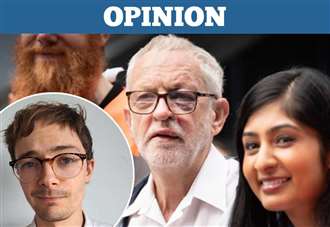For some on the British Left, Christmas came early last week.
Zarah Sultana, MP for Coventry South who lost the Labour whip about a year ago for voting against the government on the two-child benefit cap, excitedly announced plans to form a new left-wing party. Twitchier politicos on both sides should restrain their enthusiasm; this party will not be leading any revolution.

Former Labour leader and now independent MP Jeremy Corbyn was touted in Ms Sultana’s letter as the inaugural co-leader of this new party.
However, the Times reported later that Mr Corbyn and those close to him were “furious” about the manner of the announcement, and Corbyn himself later posted a vague message on social media saying a new party is in the works, but that “discussions are ongoing.”
Corbyn’s 2015 election as Labour leader and tumultuous four years in office were the thunderous death rattle of that party’s leftmost fringe.
Coming from the Bennite tradition, and long fixated on foreign politics and conflicts more so than on domestic issues, his leadership received the support of near enough every faction on the far-left both within and outside of Labour.
On much of the British Left, the role of Labour has been a sticking point for decades.

There is a split between those of the Bennite-Corbynite continuum, and some Trotskyists, who thought Labour could be taken over and turned into a radical party, and those who think Labour is irredeemable and unfixable, and that they must stand in opposition to it.
Keir Starmer’s iron grip over Labour’s internal machine since his 2020 election to the leadership has, for many, conclusively answered that question. Far-left factions within the party were proscribed, and their members banned. Many of that ilk have found somewhere else to go or shrunk away from political participation since.
These are the likely foot soldiers and voters of this new Left party. The Revolutionary Communist Party (RCP) – a rebranding of a faction purged from Labour – has said that even they have been involved in the discussions around this new party.
No doubt it would also absorb groups like the Trade Unionist and Socialist Coalition (TUSC), though the more sectarian fringe like the RCP and Socialist Workers Party may ultimately choose not to join, preferring ideological purity.
Corbyn and his ilk no doubt genuinely believe they could form the new party of the working class. Yet part of why the Left finds itself so marginalised and irrelevant is precisely because their relationship to the working class is parasocial at best, and actively antagonistic at worst.

As writer Alex Hochuli has argued, the activist and loyal support base of Left politics in the democratic world, especially in its more radical forms, is essentially a fraction of public sector professionals and the MAANGO class – those who work in Media, Academia, the Arts and NGOs.
This new party will reflect the ideological preoccupations of that coalition, which have been cultivated in concert with the Left’s retreat from the material concerns of the working class. Foreign wars, issues of gender and sexual identity, pro-immigration sentiment.
The substance of these issues aside, in the eyes of the general public they range from eccentric to viciously unpopular. There are also already parties catering to those interests with which they will have to either compete or ally themselves – most importantly the Greens.
In her post announcing the new party, Ms Sultana even quoted the murdered German revolutionary Rosa Luxemburg, saying that at the next election the choice will be between “socialism or barbarism”.
Like the Thatcherites they despise, many on the Left have convinced themselves socialism is when the government spends more money, but on their morally preferred projects.

If it took power, this new party would not be transferring control of society to the working masses and “replacing the government of people with the administration of things”, as Engels put it.
Theirs would be a party and state run by quangocrats, HR managers, former charity officials, professional activists and lobbyists and public sector trade union alumni: almost precisely what the Labour Party has already delivered in both opposition and government for many years, just more righteous in spirit and purpose.
This fringe of the Left views the Labour Party as a den of vipers, but they were hatched from the same clutch of eggs.
The working class of Britain is politically disorganised, but the tremors of a new movement against a reviled establishment began with Ukip and Brexit, and currently find an uneasy and temporary home in Reform UK.
Sultana and Corbyn are right. There is a new politics brewing in this country. But it will ride roughshod over the exhausted traditions of the 20th century, including them.
